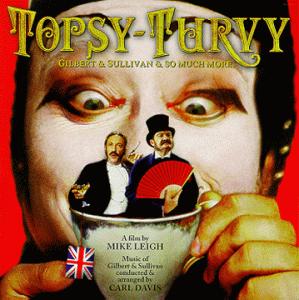Topsy-Turvy (1999)
A Film by Mike Leigh
Music Conducted and Arranged |
|
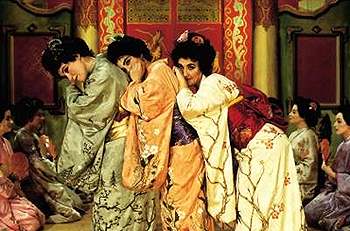 Three Little Maids (Cathy Sara as Sybil Grey, Shirley Henderson as Leonora Braham, Dorothy Atkinson as Jessie Bond) |
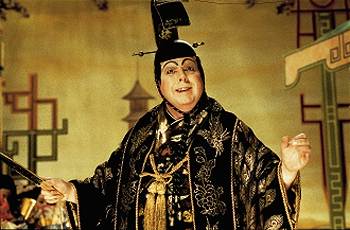 Richard Temple (Timothy Spall) playing The Mikado |
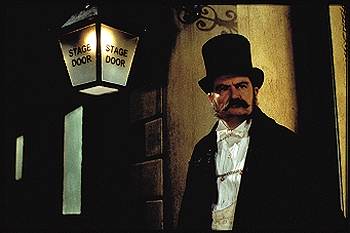 W. S. Gilbert (Jim Broadbent) |
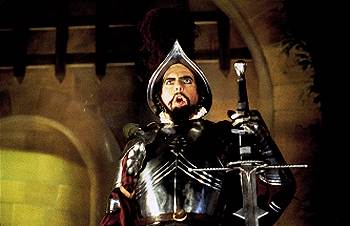 Richard Temple (Timothy Spall) playing Arac |
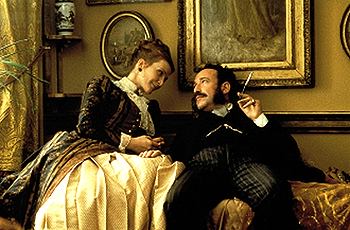 Mrs. Ronalds and Sir Arthur Sullivan (Eleanor David and Alan Corduner) |
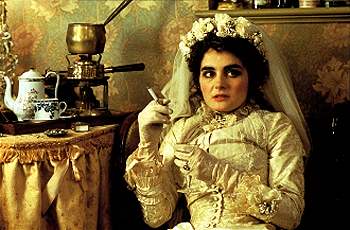 Leonora Braham (Shirley Henderson) |
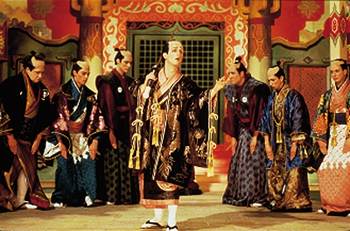 George Grossmith (Martin Savage) playing Ko-Ko |
I have seen no other Mike Leigh films, but his directorial approach has been described as "a slice as life," focusing more on the characters than on the story. That is exactly what he does in Topsy-Turvy. The gestation of The Mikado provides the framework, but Leigh luxuriates in the characters' everyday lives. Indeed, it is not so much a plot, as merely a series of incidents, many of which could probably be presented in a different order or omitted altogether without loss of continuity. I suspect that many more such incidents were filmed than made the final cut. The film's ending is not so much a conclusion, as just a stopping point. None of this is to say that I wish to see Topsy-Turvy even a nano-second shorter; I would happily have watched it all night. But, at 2:40 the film is a long one, and I did not encounter anyone who was confident that it would play well at this length with the general public.
Jim Broadbent's W. S. Gilbert deserves all the praise it has received. He brings the irrascible librettist vividly to life. Many of the famous ripostes are there, and in other places I found myself thinking: "If Gilbert never said that, he certainly should have." Alan Corduner's Sullivan doesn't reach the same heights. His amiable good nature provides a suitable contrast to Broadbent's spicy sarcasm, but Corduner lacks the charisma and charm that I think the real Sullivan had.
The large supporting cast are nearly all successful. Ron Cook's D'Oyly Carte has the oily slickness and smooth diplomacy that kept the partners together for so many years. Wendy Nottingham's Helen Lenoir is the gentle but ever-present "power behind the throne." I am told that the character of Kitty Gilbert gave the filmmakers much trouble, as so little is known about her. Lesley Manville will be remembered for her emphasis on Kitty's vulnerabilities, particularly the lack of a sex life between her and her husband. All this must be speculative, but Manville makes it believable.
The most unsuccessful portrayal is Eleanor David's Fanny Ronalds. She doesn't look at all like the photos of Mrs. Ronalds that I've seen, nor did I feel much chemistry between her and Corduner's Sullivan. The love scenes between them are solidly G-rated. Now, I'm not saying that we needed a hot sex scene, but too little of the passion between them comes through. Her singing of "The Lost Chord" comes nowhere near the magical frisson that the real thing is supposed to have generated. It also seems that she has a different accent in every scene.
The filmmakers did considerable research on the original performers, and they come to life here like never before. Timothy Spall as Richard Temple receives third billing (behind only Broadbent and Corduner), and he gives Temple an unexpected vulnerability. It is a solid, well-rounded character. I have to assume that he was chosen for his acting ability, and unfortunately he lacks the solid bass voice that I assume Temple had. If anything, he seems to overcompensate for this, resulting in his crooning and/or singing out-of-tune on a number of occasions.
Martin Savage is the spitting image of George Grossmith, and he puts some wonderful characterization into his songs. We see him in three of his roles (Gama, Wells, and Ko-Ko), and he sings "If you give me your attention" about as well as I've ever heard. In The Mikado, he is asked to portray an actor giving a poor performance due to nervousness and a morphine high, and he also manages this brilliantly. The one thing I didn't get from Savage's Grossmith was any sense that he could captivate an audience on his own, as Grossmith is known to have done in his private entertainments.
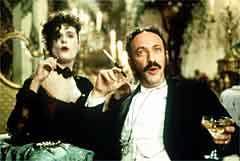 Sullivan (Alan Corduner) in a French Brothel |
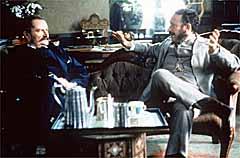 Gilbert (Jim Broadbent, left) proposes a "magic potion" plot to Sullivan (Alan Corduner, right) |
Kevin McKidd's Durward Lely is figured prominently. I came to the film with no definite sense about what Lely should be like. In most of his scenes, he seems to be an almost happy-go-lucky character, but like most tenors he is tempermental when he is asked to change a performance ritual (in this case, a corset, which Gilbert insists he must not wear as Nanki-Poo). Vincent Franklin as Rutland Barrington doesn't get as much of a chance to shine, but I certainly found him believable.
On the distaff side, Dorothy Adkinson captures Jessie Bond's saucy, sexy allure just about perfectly. She is exactly what I imagined Jessie Bond to be. Shirley Henderson's alcoholic Leonora Braham is full of nervous insecurities, but she sings "The sun whose rays" with considerable beauty. Here, too, is an unforgettable character. Louise Gold's Rosina Brandram is reduced to a mere cameo; I am fairly certain that this role was originally intended to be larger.
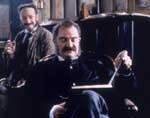 Gilbert reads a first draft of The Mikado to Sullivan |
The film is full of memorable supporting characters, such as Gilbert's dentist (David Neville), Gilbert's mother (Eve Pearce), Gilbert's father (Charles Simon), Savoy choreographer John D'Auban (Andy Serkis), and Savoy stage manager W. H. Seymour (Nick Bartlett). Among the ladies and gentlemen of the chorus, each of whom is specifically named, Savoyards will recognize Simon Butteriss (D'Oyly Carte and G&S Opera Company patter baritone).
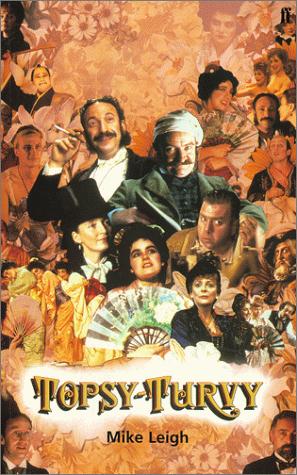 The book jacket |
The story is a series of episodes in the genesis of The Mikado, starting with the lacklustre opening night of its predecessor, Princess Ida. Leigh is selective about what events he chooses to put on screen, but those he does portray are presented at an affectionate and leisurely pace. For example, he lingers at some length on the Japanese exhibition at Knightsbridge. But, neither protagonist is shown in the throes of composition—Leigh skips right past that.
The allocation of fully staged musical numbers must be described as generous—about a dozen of them. For the most part, if Leigh gives you any part of a number, he gives you all of it. We see a couple of numbers each from Princess Ida and The Sorcerer, a most unexpected luxury that also highlights just how radical a departure The Mikado was for Gilbert and Sullivan.
Topsy-Turvy will put Gilbert & Sullivan addicts in seventh heaven. How it will be received by the Great Unwashed remains to be seen.
The Soundtrack CD
The soundtrack is by Carl Davis, all taken from the works of Arthur Sullivan. Besides the three operas that actually figure in the story, we hear music from Pirates, Patience, Yeomen, Gondoliers, and Grand Duke. A piece on the soundtrack CD called "Resolutions" is an arrangement of "The Long Day Closes." All of the music is performed to a high standard, notwithstanding my reservations about a few of the singers. Mike Leigh's fondness for The Grand Duke is evident in the inclusion of two numbers from that opera.
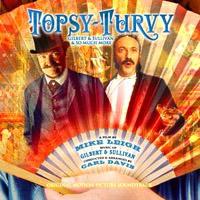 Sony SK61834 |
The packaging of the CD is a little odd. The numbers are not presented in the order they appear in the film. There is at least one number in the film that is not on the CD ("This helmet, I suppose" from Princess Ida), and at least one number on the CD that is not in the film (the Country Dance from The Sorcerer). Three overtures are included on the CD (those of Princess Ida, The Mikado, and The Yeomen of the Guard). All three are in the film, though not played through as on the CD. The film's musical research was a bit lax: several numbers are presented in post-first-night versions, most glaringly the Act II finale. The bassoon chuckle is included in "Three little maids," even though this was not added till the 1895 revival.
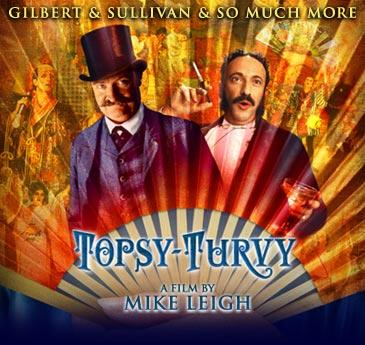 Teaser image, similar to the CD cover (above) |
The numbers on the CD are as follows:
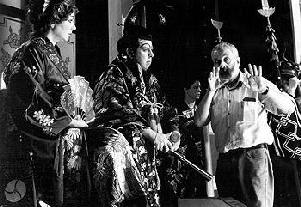 Mike Leigh directs a scene with Rosina Brandram (Louise Gold) and Richard Temple (Timothy Spall) |
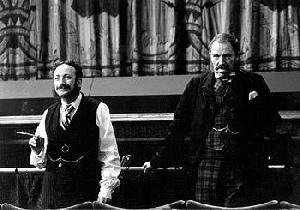 Sullivan and Gilbert give performance notes to the company after the dress rehearsal of The Mikado |
- Behold! The Lord High Executioner
- Overture to The Mikado
- Three little maids from school
- Overture to Princess Ida
- If you give me your attention
- Paris Gallop (Dance from The Grand Duke)
- Mi-ya Sa-ma and A more humane Mikado
- But soft...Why, where be oi?
- "Alone" ("'Tis said that joy in full perfection" from The Yeomen of the Guard)
- The criminal cried as he dropped him down
- Overture to The Yeomen of the Guard
- A wand'ring minstrel I
- The sun whose rays are all ablaze
- End titles ("Climbing over rocky mountain" from The Pirates of Penzance plus dance for Rudolph and the Baroness from The Grand Duke)
- Incantation from The Sorcerer
- "The fitting" ("Take a pair of sparkling eyes" from The Gondoliers)
- The Lost Chord
- Act II finale from The Mikado
- "Resolutions" (arrangement of "The Long Day Closes")
Topsy-Turvy on DVD
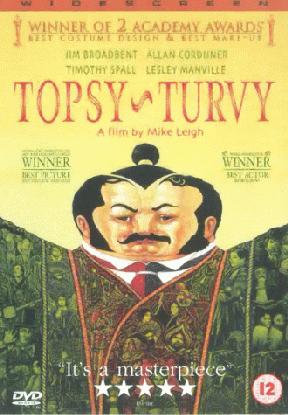 U.K. DVD Issue |
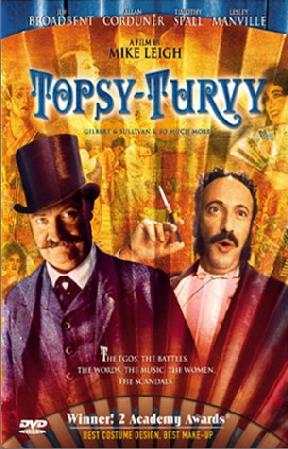 U.S. DVD Issue |
Topsy-Turvy was issued on DVD in both the U.S. and U.K. regions. As most DVD buyers will know, a typical DVD is "encoded" for a particular geographical region. To play a DVD, the region of the DVD must be consistent with the capabilities of the playback equipment. Further complicating matters, there are some players that can play DVDs from any region, and there are some DVDs that will work in all regions regardless of the player. Most commercial films are region-encoded, and this applies to Topsy-Turvy.
The two versions of Topsy-Turvy on DVD are considerably different from one another, as Peter Parker reported:
At long last I took delivery of the UK version of TT yesterday and have started to compare it with the USA version. It is quite a different DVD. Both contain the TT film as such but virtually all the other attributes and facilities are different.
The subtitles are totally re-written (and contain at least one gross error. There may be others yet to find). At the start of the Ida overture (near the start of the film) a subtitle appears "Now hearken to my strict command." This on the UK version only.
The UK version has subtitles only in English for the hard of hearing, no other languages. The USA version has French and Spanish.
There may well be a lot of other differences but the principal change is that the UK version has the option of a director's commentary. This turns out to be the entire film with the sound level reduced and with an overview spoken by Mike Leigh about what he intended to portray and why. I have not yet listened to this right through, but it reveals his thinking behind the filming.
This is quite different from the USA version but that has" TV spots; Featurette (??); Photo Gallery' Cast and crew biographies and filmographies; and a bit about G & S as individuals. None of these items are on the UK version.
The packaging is different, with the USA version having the "fans" and the UK version having that awful face. The actual presentation on screen and the control over what to see is also quite different in operation in both versions. One can set up the UK version to have Mike Leigh's superimposed talk and the film with or without the subtitles all simultaneously.
It is quite clear that the film has been put to DVD by different companies with different objectives. Does this apply to other region 1 region 2 DVDs of the supposedly same film? I am a beginner at DVDs and so far only have the two versions of TT and a 1988 La Boheme of Pavarotti in region 2 PAL but filmed in San Francisco.
Peter summarized the differences between the two versions as follows:
| USA Version | UK Version | |
|---|---|---|
| Time (as quoted on boxes) | 161 miutes | 152 minutes |
| Leaflet | Yes | No |
| Chapters | 39 | 24 |
| System | NTSC | PAL |
| Aspect | 16:9 | 16:9 Letterbox |
| Region | 1 | 2 |
| Subtitles | English closed captioned Spanish French | Hard of hearing English only. |
| Rating | R (Not stated on box) | 12 |
| Director's commentary | No | Yes |
| Audio out | Dolby 2.0 or 5.1 | Not stated but believed to be Dolby 2.0 only |
| Date | Label | Format | Number | Comments |
|---|---|---|---|---|
| 1999 | Thin Man Films | Film | N/A | |
| Dec. 7, 1999 | Sony | CD | SK61834 | |
| June 20, 2000 | USA Films | DVD | ASIN: 630589423X | U.S. version, with region encoding for the US and Canada only |
| Sept. 11, 2000 | Pathé Dist. Ltd | DVD | Cat: P8968DVD ASIN: B00004U40S |
U.K. version, with region encoding for Europe, Middle East, and Japan only |
